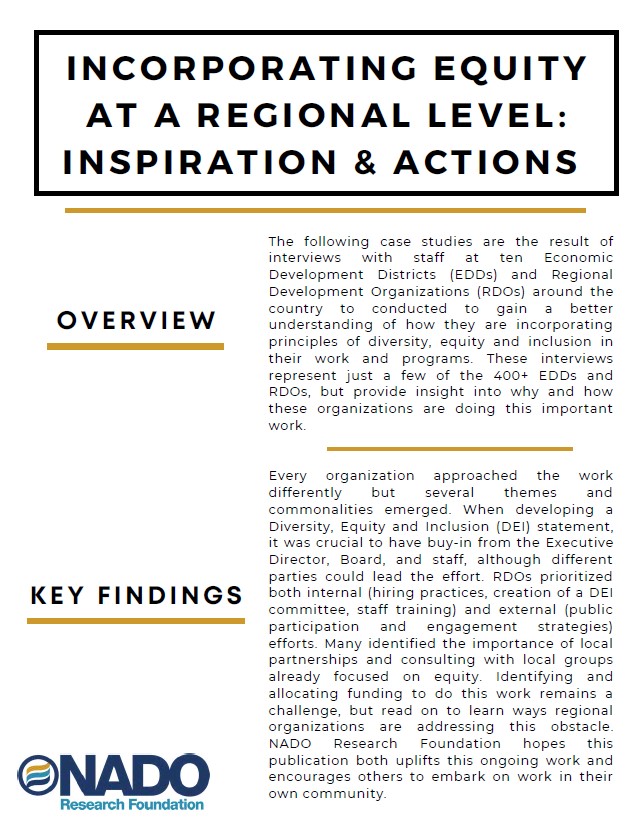Economic Development Districts (EDDs) and Regional Development Organizations (RDOs) around the country are incorporating principles of diversity, equity and inclusion into their work. This report (PDF) is the result of interviews with staff at ten organizations, representing just a few of the 400+ EDDs and RDOs. They provide insight into why and how these organizations are doing this important work.
In addition to Diversity, Equity and Inclusion statements, here are some highlights of the work being done at these ten organizations. You can access the case studies individually by clicking on the organization’s name below:
Chittenden County Regional Planning Commission (PDF)
- ‘Ensuring Equity’ is a guiding principle in CEDS & Transportation Plan
- Published annual report focused on inequities in the region
- Commissioned an Equity Assessment Report and led a regional equity summit
- Formed an equity leadership team
- Partnered with Vermont Racial Justice Alliance
- Contracted with Vermont Professionals of Color Network to assist with public engagement
Land of Sky Regional Council (PDF)
- Developed Story Map to share data on racial disparities in the region
- Formed a DEI committee of leadership, staff and HR
- Updated hiring and contracting policies
- Updated public participation plans
- Conducted internal DEI training and brought in consultants
- Partnering with local groups to affect change, including assisting with DEI training in the community
Mid-Columbia Economic Development District (PDF)
- Developed a DEI statement and plan, with support from staff and Board
- Monthly meeting to discuss DEI related topics
- Equitable outcomes is a major CEDS theme
- Working with a local non-profit to do focus groups with underrepresented communities to inform the CEDS
- Translating select documentation into Spanish
Mid-Ohio Regional Planning Commission (PDF)
- Partnered with YWCA Columbus to provide social and racial justice classes to MORPC stakeholders
- Developed an Diversity, Equity and Inclusion plan
- Led a Racial Equity Conversation Series with Atlanta Regional Council
- Formed a DEI Committee to prioritize goals and review internal organizational structures
- Discussing DEI in other committee and employee groups
Old Colony Planning Council (PDF)
- Created a task force to lead discussions on equity
- Developed Mission Statement which includes actions
- Procurement policy to send RFPs to diverse suppliers
- Aligned with workforce agencies that intentionally reach diverse candidates
- Public Participation Plan to outreach to underrepresented communities
- Consulting with local groups already focused on equity, listen to those with lived experiences, and be willing to change opinions and perspectives
PlanRVA (PDF)
- Developed an Equitable Community Engagement Strategy
- Created a social media and media outreach guide
- Established and filled a new full time Community Engagement Manager position
- Updating hiring and purchasing policies
- Staff education through lunch sessions
- Designed an inclusive and intentionally welcoming office space
- Launching a new Title VI Training Program
Souris Basin (PDF)
- Inclusivity Statement has helped when building new program to ensure they align with the state goals
- Identified formal priority to focus on non-traditional entrepreneurs as recipients of RLF loans
Southeastern Regional Planning & Economic Development District (PDF)
- Staff led effort to review existing programs and provide recommendations to better achieve the organization’s mission and respond to social and environmental justice principles
- Project Scoping guidelines updated to ensure inclusion of vulnerable populations
- Produced recommendations on affordable housing production, and ADA Self-Evaluation and Transition plans for two communities
- Intends to expand work into restorative justice practices that recognize and celebrate the region’s history and differences
Triangle J Council of Governments (PDF)
- Made DEI an organizational priority which should inform work in all program areas
- Created internal task force to address DEI priorities and brought in experts for staff training
- Member of Government Alliance on Race & Equity (GARE)
- Working to incorporate DEI principles into the next CEDS and other planning documents
West Michigan Shoreline Regional Development Commission (PDF)
- Equity statement memorialized ongoing work and helps ensure future work is aligned with the stated goals
- Equity statement in all annual reports to ensure its central focus
- Statement addresses the ‘Why, How and What’ behind the Commission’s work
For more information please contact Ciara Ristig [email protected]
This resource was prepared by sub-awardee the NADO Research Foundation using Federal funds under award ED21HDQ3070009 to the New Growth Innovation Network (NGIN) from the U.S. Economic Development Administration, U.S. Department of Commerce. The statements, findings, conclusions, and recommendations are those of the participant(s) and do not necessarily reflect the views of the U.S. Economic Development Administration or the U.S. Department of Commerce. For more information about the project, please visit NGIN’s project page. To view PDFs, use a viewer such as Adobe Reader.


